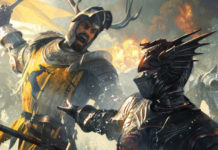Christopher Paolini took over 3 years to write Inheritance, the final book in the Eragon cycle, and Inheritance is most definitely worth the wait.
For those not familiar with the four books, Paolini’s bestseller series records the tale of a young adult named Eragon as he struggles to overthrow Galbatorix, an evil tyrant who rules the fantasy word of Algaesia with an iron fist. The previous three books, Eragon, Eldest, and Brisingr, weave such an elaborate narrative that readers picking up the series in its final chapter will find themselves hopelessly confused.
The series lays out Eragon’s epic quest for power, during which the hero discovers that he and the evil king are the only two surviving Dragon Riders. The two are remnants of an ancient order that was extinguished by Galbatorix when he grew disenchanted with it.
Inheritance picks up almost immediately where Brisingr left off, beginning in the middle of a bloody slaughter by Eragon as he leads an army into battle. For the majority of the story, Inheritance does not deviate far from its roots, describing battle after battle, decisive victory after decisive victory, using each military conquest as a means to introduce some item or idea that will help Eragon when it finally comes time to do battle with his arch-nemesis.
Despite having a formulaic plot structure for half the book, Paolini keeps the reader entertained by elaborating on the fiction in his fantasy universe. The Eragon cycle is filled with plenty of staples of the fantasy genre such as elves, dragons, werecats, shades, mystical weapons, magic, and ancient languages; Inheritance does an excellent job of utilizing these elements. By the end of Inheritance, readers will have learned more about the cultural traditions of the society than they would in a history book; readers will know more of the native language that Paolini incorporates throughout his series than they would in Spanish language class.
What would normally be described as a boring lesson, however, proves to be engrossing and exciting, with every revelation about the realm of Alagaesia having a direct impact on the path of the plot.
In all honesty, the fantastical elaboration could have been thinned out, because some of the less relevant sections of Inheritance create blaring plot holes that make the reader wonder why Eragon, after having slain several hundred men in combat over a day’s time, would sit helpless by the side of a tent as a personal acquaintance gives birth to an overdue child that, without magical assistance, could kill both mother and child. Paolini, however, never addresses these more annoying (and less important) flaws in his story, instead leaving Inheritance pockmarked by Eragon’s scattered moments of weakness.
In contrast to the first 500 pages of the book, the last 300 pages are so packed with plot twists, spoilers, and subplots of intrigue that I am forced to speak about the most exciting and satisfying section of the book with frustrating vagueness in order to keep the story suspenseful for those reading the review uninformed. Needless to say, Paolini is excessively kind to fans in the final 300 pages of his story, mixing a somber yet fitting conclusion to his series with philosophical and scientific musings that are carefully crafted to fit perfectly into the universe of Inheritance. As the last pages of the book fly by, Paolini gives fans the best ending they could want, one open to interpretation, one that leaves the tale open for revival.
The most stupefying plot twist in the story is expressed in two simple words, the end. The end of Inheritance does not feel like an ending at all, but a cliffhanger. I could have just as easily flipped the page and begun Paolini’s 5th book, or begun the next chapter. In the end, the next chapter is the best description of Inheritance, a story that, after 3 years of unbearable waiting, beckons readers back into the fast-paced, elaborate world that Paolini created 9 years ago.






